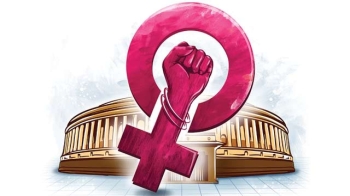
.png) Dr Suresh Mathew
Dr Suresh Mathew

Their seats are reserved. But, they have neither got the tickets nor they are aware of the timing of the journey. They are in the dark, holding on to the hope given to them -- one day they will be able to travel, using the reservation made in their name. Yes, that is the fate of the Women’s Reservation Bill, titled Nari Shakti Vandan Adhiniyam 2023, passed by the two Houses of Parliament. It is historic, no doubt, as it is the culmination of many twists and turns in the making of the Bill that affects more than half the population of the country.
The Women’s Reservation Bill was brought to Parliament several times, starting from 1996. It was again and again tabled in the House, with no success. In 2010, during the UPA government under Manmohan Singh, the Bill crossed one hurdle when it was passed in Rajya Sabha, but not lucky in Lok Sabha. Now, after 13 years, it has been passed by Parliament, with near unanimity. It provides for 33 per cent (or one-third) seats for women in Lok Sabha and state Assemblies; it also provides similar reservation for women in SC, ST category. Another significant provision is that the seats reserved for women will be rotated after every delimitation exercise, presumably every 10 years.
So far so good. The representation of women at present in Parliament and state legislatures is less than 15 percent whereas at the global level women’s representation in the legislative bodies is around 24%. In Scandinavian countries, it goes up to 45 per cent while in some of the European countries it is between 30 and 35 per cent. Hence, India will be in the group of some of the European nations after the Bill becomes an Act and is implemented. It could become a watershed in the democratic journey of India.
Now comes the flip side. Despite marathon discussion in both Houses of Parliament in the run-up to the passing of the Bill, none from the government side could come up with a date when the provisions of the Bill would be implemented. The only assurance is that it would be implemented once the Census and the subsequent delimitation of constituencies are completed. Here again there is a trap. The government has not announced any date for the completion of the Census; hence there is no clarity as to when the delimitation will take place. But going by the previous delimitation which took place in 1976 based on the 1971 census, it took more than four years to complete the process. It is not clear how long women will have to wait counting down the days for the fulfillment of their dream.
Hence, one is at a loss to understand the hurry with which a special session of Parliament was convened, with the agenda shrouded in secrecy. If the provisions of the Bill are not to be implemented in the near future, it could have been passed in the coming Winter Session. It would not be wrong to say that there is more to it than meet the eyes. Women’s empowerment can happen only if the government shows political will to implement the provisions of the Bill immediately. If its intention is to open up more space for women in the political arena, it should brook no delay in implementing it.